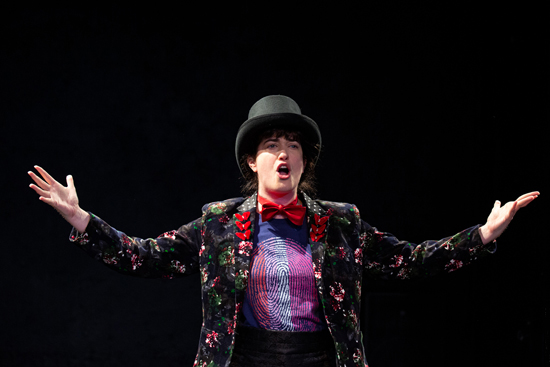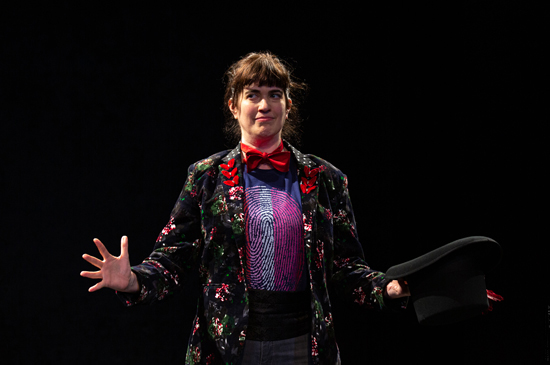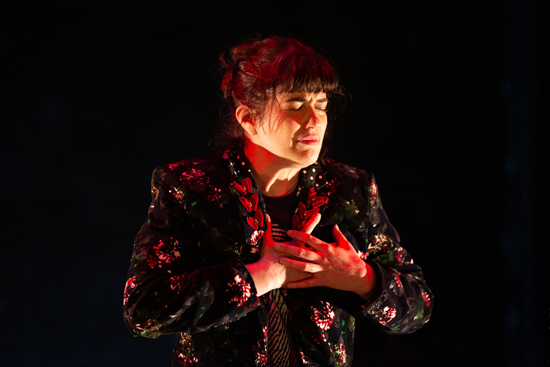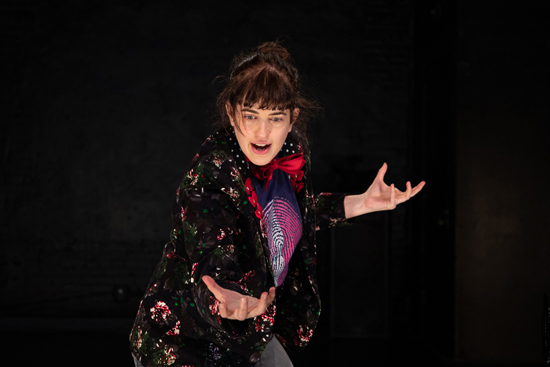OFF-TOPIC (6)
By:
June 17, 2019
Off-Topic brings you over-the-transom, on-tangent essays, dialogues and subjective scholarship on an occasional, impulsive basis. This month, a contemplation of collapsed fourth walls and what we’ll do to keep a roof suspended above us…

It only takes one to have a dialogue — especially the conflicts within our own heads. Open by Crystal Skillman is a conversation with silence; a confessional from a solitary speaker, Kristen, to the empty foreground where her lover Jenny, close to death after a random homophobic attack, is disappearing before Kristen’s eyes, too. Before that happens, Kristen is in a desperate moment of magical doing, putting on a metaphorical act to conjure Jenny into the present.
I’ve been a witness to this play since the start of its life, some six years ago before I lost my own wife; a particular soliloquy from it (in which Kristen imaginarily “levitates” with Jenny, high enough for them to look down and see their lives together play out into old age) was one of my shields against a sense of finality. And in fact, this play has been born in several forms.
In the versions I saw before, the audience is in Jenny’s place; Kristen is addressing a crowd of one, and we are being told by her who we are even as we are learning more about Kristen than she may ever have offered before. The very fact that Jenny may or may not be hearing it perhaps has something to do with how honest Kristen is being. In the new production, we are removed still farther from Jenny, back to our place as an audience, and one Kristen explicitly identifies as being all in her mind, imagined spectators to help spur her attempt to bring Jenny to life, too.
Many real people rise from the text as we hear the voices of the parents that nurtured or stunted both Kristen and Jenny, share visions of when the lovers met and how they grew closer and stayed distant, unlock the secrets of Jenny’s fearlessness and self-acceptance and Kristen’s hesitancies and regrets; cumulatively, the feat of Kristen facing what got her to the current moment, and how she can go on.
As “The Magician” (Kristen), Megan Hill gives the most phenomenal performance I will see this year. The burden is all on her, and she moves through the play conveying its weight but seemingly flying from point to point. The palette of emotions that plays across her face and the kinetic vocabulary with which she both evokes each scenario’s motions and channels sheer abstract psychological exertion shows us an expression that starts in the soul and extends to the body’s limits. She is on her own on a bare set, but tricks of selective light and well-aimed shadow throw ghost performers onto the walls and create magic murals that emerge and vanish. Hill’s skillful, restrained miming, Sound Designer Emma Wilk’s judicious effects, and Lighting & Scenic Designer Sarah Johnston’s atmospheric color sense and compositional invention have me remembering settings and locations that I know weren’t there. It is in some ways Skillman’s most sensorily rich production (though her scripts can conjure worlds for me from even simpler means), and Director Jessi D. Hill modulates the play’s emotional current with a remarkably disciplined intensity.
In the written text, Skillman situates the play in time by merely saying, “While the Magician slips into stories, she operates from the urgency of the now.” In the second weekend of Pride Month, on the morning of the Tonys and minutes after one of the show’s first performances, she and I sat down to discuss what we know now.

HILOBROW: When I saw the earlier versions of the play it was just Kristen and Jenny (from our point of view). What was your thinking behind going from this solitude to incorporating the audience?
SKILLMAN: I wanted to embrace the fact that Kristen is imagining a theatre. I also think that for the audience to be invested, they have to think that they need to believe. I’m really mindful of, what do audiences go out into the world with, and how can this play wake up with you the next morning. Maybe it’s immediate, maybe it’s just that you cry at the end of it and then you’re in a new place. Maybe it makes you more aware of what’s happening around you and makes you stand up for someone you didn’t stand up for before because you were intimidated. Any of those things.
And I have seen people [at the play] say, “Wow, that was something,” or, “This reminded me of so-and-so” — I’m seeing people talk about their own lives after the play, and I think that is always the goal that a writer is looking for. We’re not so interested in when we hear them say, “That was cool, now when do we get to Sardi’s” [laughter]. I think because people are put in such a state, they’re examining themselves, and examining the world.
In terms of the imagined audience as a concept, I think I’ve always been obsessed with it in my artistic life — from art-school days, since I was 19, since I saw Fellini. Because Fellini’s films are so much about who’s watching them, and also the characters are other people in their lives. Specifically 8 ½ has an incredible moment when anyone who’s been in any of his memories, they dance together and it is like a pageantry, and it is this beautiful, there’s a band and it’s just an incredible moment. And I think that’s why I like magic, I like circuses, because there’s something that says, “Hey, we’re in this together.”
HILOBROW: There can be a tenuous equilibrium between what’s material and what’s abstract in a play like this…
SKILLMAN: I kept hearing, in earlier versions of the show, “But it’s a magic show, and we wanna have fun,” and I was like, “Ughhh, okay” [laughs], “so what is it about this form that I’m not doing so well” — at first I took that to mean, maybe we do see the magic… but it would appear over time; maybe halfway through the play that would happen. So I did a version and was sitting at the screen thinking… “this is dumb” [laughter] — if you want to know if what you’re writing is dumb, listen to the stage directions and they’ll tell you! I had this confirmed because my friend Scott Hitchcock who’s a magician in Vegas, he consulted on the play. He read the draft — and I was just starting this version, just to see — and he said he cried when he read it, and then he goes, “And let me tell you, I don’t ever want to see the magic.” And I thought, “If even a magician tells you he doesn’t want to see the magic, you listen to the magician.” So then the question became how.
And we had a lot of talk about more bells and whistles, and a lot more big-budget, but y’know, between Jessi, myself and Megan’s work on all sorts of shows, if you can’t figure out how it works downtown, if you can’t figure how it can work with a dime, there’s just something that doesn’t work about it. It’s resting on other stuff, and there’s gonna be other stuff on top of it.
Jessica Dickey wrote a one-person play called The Amish Project in which she broke down the shootings that had happened at that school [a massacre in Nickel Mines, PA in 2006]. What she did that I really latched onto in her work was…the power of the present, and using the power of the present in a one-person play. And I thought, that’s so exciting because that one person can change that present just by saying a line, and we don’t necessarily need to see a projection or an image or have another person come onstage, it can be all there in the story.

HILOBROW: Where in your own life, or what touches you, does this play come from?
SKILLMAN: There’s a line in the play, “Reality and I don’t quite get along,” and that is a lot of me. When the Magician first happened, I started writing and the Magician just started talking, and I didn’t know it was Kristen, I didn’t know about the story, and then she just started telling the story. It’s very rare that I’ve actually channeled something like that, and it just started to build itself, and I just felt like I knew them and I just felt very… like it was something that was [really] happening.
I’d already written a bit of this, but then I completely understood how to approach it after the election. Because in my neighborhood of Brooklyn, in 24 hours my gay neighbors had been threatened, I was accosted as a woman; I’d never seen a flip like that. It was insane; swastikas appeared within 72 hours. In four days’ time someone got punched in a restaurant, a man punched a woman, for talking against Trump. We were living next to people, and with people, who… we had no idea there was such rage. The things that they weren’t saying.
That’s the message of this play in one way: how do you be fearless? How do you still be you and not have fear. How do you be kind and still protect yourself. I know that people are drawn to me because I’m open, there’s something they’re not used to. A lot of people are like, “Oh, are you enjoying your time as a tourist here in New York?” [laughs] But I have my armor on when I walk too. A great actor who I love to work with, he’s African American and we were talking, and I was talking about how I found the city to be somewhat magical, and he said, “Yeah, I don’t know if we’re walking in the same city.” Every street is different for every single person at every moment.
HILOBROW: I was struck by the recurrence of the phrase “my city” — at first reflecting Kristen’s ideal view and then her admonition about the brutal things that can happen there.
SKILLMAN: I do have pride in my city, but we don’t take care of each other all of the time, we do have a lot of issues, and then violence erupts. Now more than ever, this is an island that should be coming together. I like playing with repetition and how it grows, and how that does unexpected things. And… I’m a little obsessed with finding success and failure; a lot of [my recent plays] are about just, really having overly ambitious ideas, thoughts, concepts that are not totally sound or realistic [laughs], and somehow trying to win by using imagination, by storytelling, by communication. Death is something beyond you, and yet, we want to wrestle that angel.

HILOBROW: Bending reality with perception. I cling to the idea of consciousness as a quantum field — even though I’ve had friends poke holes in that — and thus reality being manipulable, or at least influenceable, by what we can imagine.
SKILLMAN: It is about perception, it is about how… it’s simplistic to say is the glass half-empty or half-full, but there’s something that keeps you going. There’s something about going through it. You’ve got to move… it’s not so much live through it, you’ve got to move through a moment — and sometimes the moment’s quite long, or years — but you’ve just got to keep moving through it because there are some things that happen in ways… things are changing around you that you have no idea about and there’s lots of positive momentum that we don’t see and feel. For all we talk about how something bad is happening here and something bad is happening there, likewise something good is happening here and something good is happening over there that we can’t even see, and those things are having effects. And I guess that’s where the ultimate [narrative] conflicts of fights, and trying to right the scales of justice come from; it’s not a perfect world.
HILOBROW: And it’s uneven — as per William Gibson, “the future is already here, but it’s not evenly distributed.” And it’s interesting that you should say “scales of justice,” because I’ve come to very much think of history as a tipping balance, not as a line that you can make advances or retreats along. Our worst and best selves and outcomes are always side-by-side, and it’s a matter of what course you plot through that. This means the evils of existence will always be with us, but it’s never game-over either.
SKILLMAN: We can put out our energy for the Rebel Alliance — we’ve got 20 of them, so… [laughter]. I do believe that everyone in your life has been there for a reason, and I think the love you’ve experienced is there for a reason, I think it changes the world, and I think that energy is still with us. And I think there’s a lot in this play too about letting go but realizing that you haven’t lost. You’ve gained.
Open’s current run continues at The Tank in NYC through June 22, 2019
All photos by Maria Baranova
MORE POSTS by ADAM McGOVERN: OFF-TOPIC (2019–2025 monthly) | textshow (2018 quarterly) | PANEL ZERO (comics-related Q&As, 2018 monthly) | THIS: (2016–2017 weekly) | PEOPLE YOU MEET IN HELL, a 5-part series about characters in McGovern’s and Paolo Leandri’s comic Nightworld | Two IDORU JONES comics by McGovern and Paolo Leandri | BOWIEOLOGY: Celebrating 50 years of Bowie | ODD ABSURDUM: How Felix invented the 21st century self | CROM YOUR ENTHUSIASM: C.L. Moore’s JIREL OF JOIRY stories | KERN YOUR ENTHUSIASM: Data 70 | HERC YOUR ENTHUSIASM: “Freedom” | KIRK YOUR ENTHUSIASM: Captain Camelot | KIRB YOUR ENTHUSIASM: Full Fathom Five | A 5-part series on Jack Kirby’s Fourth World mythos | Reviews of Annie Nocenti’s comics Katana, Catwoman, Klarion, and Green Arrow | The curated series FANCHILD | To see all of Adam’s posts, including HiLo Hero items on Lilli Carré, Judy Garland, Wally Wood, and others: CLICK HERE
